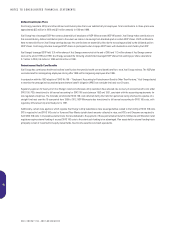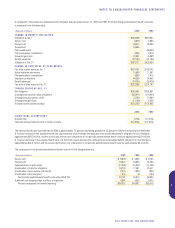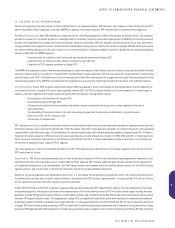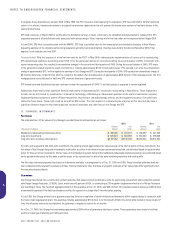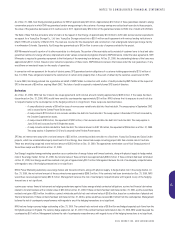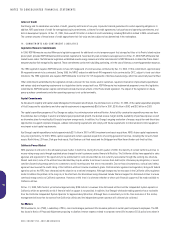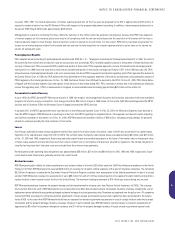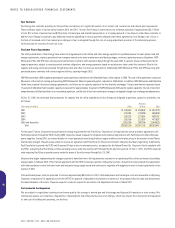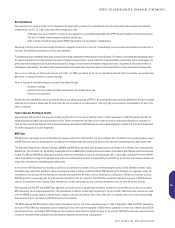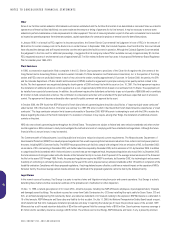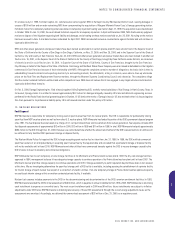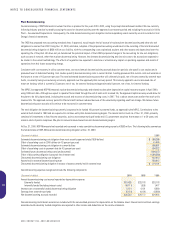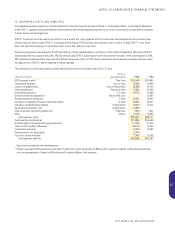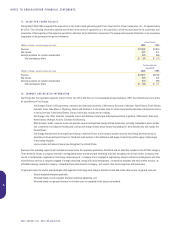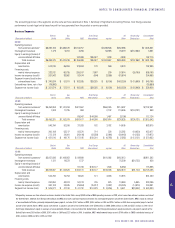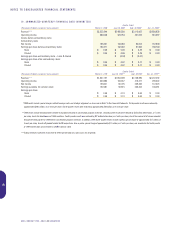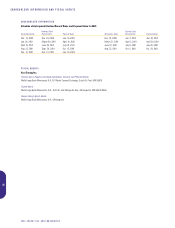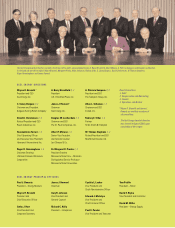Xcel Energy 2000 Annual Report Download - page 31
Download and view the complete annual report
Please find page 31 of the 2000 Xcel Energy annual report below. You can navigate through the pages in the report by either clicking on the pages listed below, or by using the keyword search tool below to find specific information within the annual report.
Other
Some of our facilities contain asbestos. Most asbestos will remain undisturbed until the facilities that contain it are demolished or renovated. Since we intend to
operate most of these facilities indefinitely, we cannot estimate the amount or timing of payments for its final removal. It may be necessary to remove some
asbestos to perform maintenance or make improvements to other equipment. The cost of removing asbestos as part of other work is immaterial and is recorded
as incurred as operating expenses for maintenance projects, capital expenditures for construction projects or removal costs for demolition projects.
In January 1996, in a lawsuit by PSCo against its insurance providers, the Denver District Court entered final judgment in favor of PSCo in the amount of
$5.6 million for certain cleanup costs at the Barter site in central Denver. In September 1999, the Colorado Supreme Court held that the trial court should
have allocated the damages and self-insured retentions over the entire period the facilities were in operation. Although the Colorado Supreme Court remanded
the judgement to the trial court for additional proceedings, it suggested that its ruling may reduce PSCo’s available recovery to approximately $1.4 million.
PSCo requested recovery of environmental costs of approximately $7.7 million related to Barter over four years in its proposed Performance-Based Regulatory
Plan for calendar years 1998–2001.
Plant Emissions
In 1996, a conservation organization filed a complaint in the U.S. District Court pursuant to provisions of the Clean Air Act against the joint owners of the
Craig Steam Electric Generating Station, located in western Colorado. Tri-State Generation and Transmission Association, Inc. is the operator of the Craig
station and PSCo owns an undivided interest in each of two units at the station, totaling approximately 9.7 percent. In October 2000, the parties, the EPA
and the Colorado Department of Public Health and Environment (CDPHE) reached an agreement in principle resolving all air-quality matters related to the
facility. The final agreement was negotiated during the fourth quarter of 2000 and was filed with the court on Jan. 10, 2001. The final agreement requires
the installation of additional emission control equipment at a cost of approximately $105 million (based on an estimate from Tri-State). The equipment will
be installed over a period of several years. In addition, the settlement requires the defendants collectively to pay a civil penalty of $500,000 and to contribute
$1.5 million to fund conservation activities. The contribution to conservation activities will be refunded if the plant achieves a specified level of emissions
control. The agreement will become enforceable after a period for public comment and approval by the court.
In October 2000, the EPA found that NSP-Wisconsin’s French Island electric generating plant should be classified as a “large municipal waste combustor”
under Section 129 of the Clean Air Act. This letter was contrary to a 1997 EPA letter in which it had found that French Island should be classified as a “small
combustor.” The large combustor emission limits became enforceable in December 2000. NSP-Wisconsin is attempting to work with the EPA to resolve the
dispute regarding the status of the French Island plant. If a resolution is finalized, it may require, among other things, the installation of additional emission
controls on the plant.
NRG also owns electric generating plants throughout the United States. These plants are subject to federal and state emission standards and other environ-
mental regulations. NRG continues to study and investigate the methods and costs of complying with these standards and regulations. Although the future
financial effect is not yet known, it may be material.
The Commonwealth of Massachusetts is seeking additional emissions reductions beyond current requirements. The Massachusetts Department of
Environmental Protection (MDEP) has issued proposed regulations that would require significant emissions reductions from certain coal-fired power plants in
the state, including NRG’s Somerset facility. The MDEP has proposed that such facilities comply with stringent limits on emissions of NOxby December 2003;
on emissions of SO2commencing in December 2003, with further reductions required by December 2005; and on emissions of CO2by December 2005. In addition
to output-based limits (a standard which limits emissions to a certain rate per net megawatt-hour), the proposed regulations also would limit, by December 2003,
the total emissions of nitrogen oxides and sulfur dioxide at the Somerset facility to no more than 75 percent of the average annual emissions of the Somerset
facility for the years 1997 through 1999. Finally, the proposed regulations require the MDEP to evaluate, by December 2002, the technological and economic
feasibility of controlling or eliminating mercury emissions by the year 2010, and to propose mercury emission standards within 18 months of completion of the
feasibility evaluation. Compliance with these proposed regulations, if such regulations become effective, could have a material impact on the operation of NRG’s
Somerset facility. The annual average carbon dioxide emission rate identified in the proposed regulations cannot be met by the Somerset facility.
Legal Claims
In the normal course of business, Xcel Energy is a party to routine claims and litigation arising from prior and current operations. Xcel Energy is actively
defending these matters and has recorded an estimate of the probable cost of settlement or other disposition.
On Dec. 11, 1998, a natural gas explosion in St. Cloud, Minn., killed four people, including two NSP-Minnesota employees, injured approximately 14 people
and damaged several buildings. The accident occurred as a crew from Cable Constructors Inc. (CCI) was installing fiber optic cable for Seren. Seren, CCI and
Sirti, an architecture/engineering firm retained by Seren, are named as defendants in 22 lawsuits relating to the explosion. NSP-Minnesota is a defendant in
19 of the lawsuits. NSP-Minnesota and Seren deny any liability for this accident. On July 11, 2000, the National Transportation Safety Board issued a report,
which determined that CCI’s inadequate installation procedures and delay in reporting the natural gas hit were the proximate cause of the accident. NSP-
Minnesota has a self-insured retention deductible of $2 million with general liability coverage limits of $185 million. Seren’s primary insurance coverage is
$1 million and its secondary insurance coverage is $185 million. The ultimate cost to Xcel Energy, NSP-Minnesota and Seren, if any, is presently unknown.
60
XCEL ENERGY INC. AND SUBSIDIARIES
NOTES TO CONSOLIDATED FINANCIAL STATEMENTS


